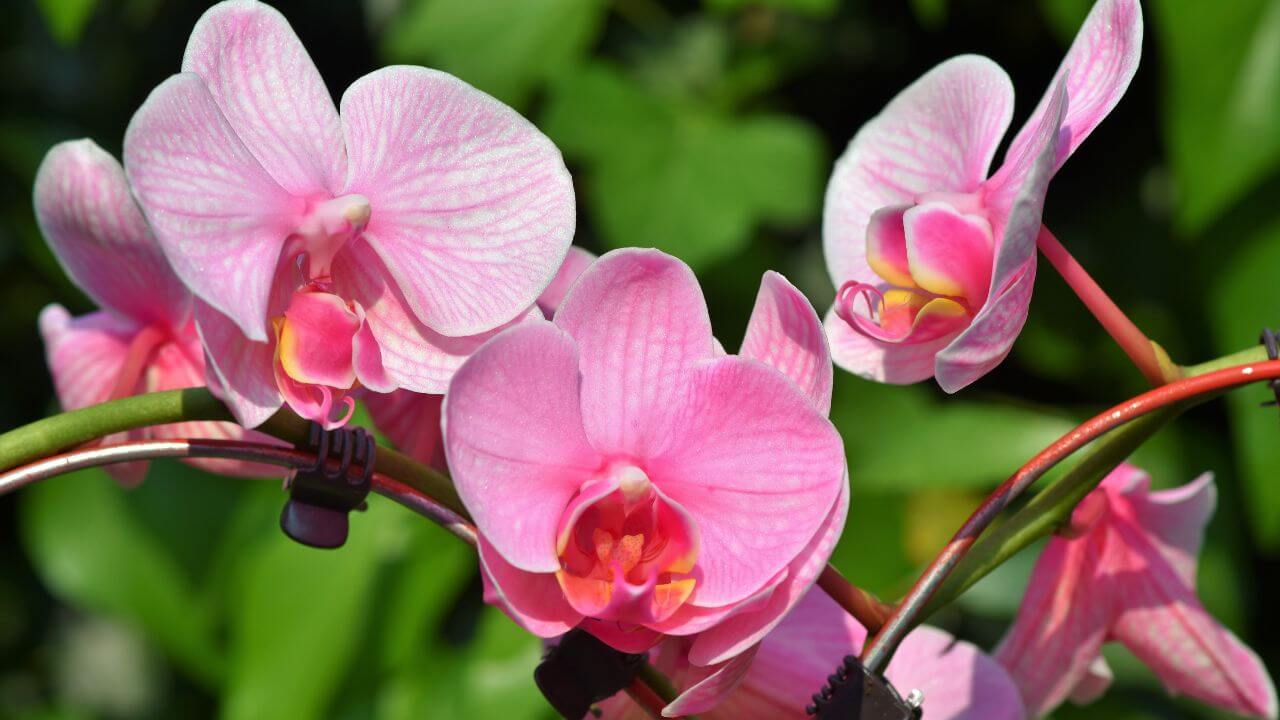Suppose the flowers on your orchid are falling off one by one. You’ve been trying to figure out what might be causing this, but you haven’t been able to find an answer. So you are not sure if it’s something that you’ve done or if there’s something wrong with your orchid.
There is a good chance that your orchid’s flowers are falling off because they are done blooming. The orchid is about to enter a period of dormancy when it will sleep and get ready to bloom again. Flowers can also die and fall off their stems if they have an imbalanced temperature or humidity or if they get too much or too little water.
I will show you why the orchid flowers are falling off and what you can do after blooming.
Quick Navigation
The 7 Most Common Reasons Your Orchid Flowers Are Falling Off
You might be wondering why the flowers are falling off. The following are the seven most common explanations:
Orchid flowers fall off naturally
Orchid flowers can last up to six or eight weeks before they fall off naturally. This is due to the delicate nature of orchid flowers and how their roots grow. As the roots grow, they can pull on the stem of the orchid flower, causing it to fall off.
Changes in temperature
Most people think that orchid flowers are inconsistent, which means they are very sensitive to changes in temperature. When the temperature changes too much, the plant’s internal systems can be thrown off, which can cause the flower petals to fall off.
Orchids usually prefer a temperature range of 66°F to 86°F (19°C to 30°C) during the day and 61°F to 66°F (16°C to 19°C) at night. The flowers will fall off if the temperature changes a lot outside of what an orchid is used to.
Underwatering
Underwatering is the number one cause of orchid flowers falling off. When in bloom or flower buds are growing, you should give orchids a good soak every week. When orchids are watered too little, their cells become dehydrated, and the flowers start to fall off to conserve resources. The orchid has to use its resources (flowers) to preserve itself. Overwatering can also be a problem because it causes root rot, which can kill an orchid.
Overwatering
A common cause of orchid flowers falling off is overwatering. Suppose the potting medium is too damp from overwatering or the medium itself retains moisture for too long. In that case, the orchid’s roots can die, and the flowers fall off. Overwatering can also cause fungal overgrowth, damaging the plant’s leaves and roots. If your orchid has signs of fungal overgrowth, like a musty smell, you should treat it with a fungicide immediately.
To prevent this, ensure the potting medium is evenly moist but not soggy, and water your orchid only when the soil’s surface feels dry.
Lack of Humidity
When the ambient humidity falls below 30%, water droplets will bead up on the leaves and then run off. This is because the plant’s surface tension is greater than that of the water, which causes them to bead up and flow away. When the humidity falls below 20%, leaves will start to dry out and may even fall off.
You can help your orchid retain humidity by misting it daily or keeping it in a humid environment. You can also place a small water bowl next to your orchid or in a humidifier.
If you notice that your orchid’s flowers are petal-less and falling off, it may be time to water it more frequently or increase the humidity in your home. If the problem persists, it may be time to bring your orchid to a horticultural specialist for diagnosis.
Inappropriate repotting
Repotting orchid plants is not always an easy task. The plants can get root-bound and require serious breaking in before they start to grow vigorously again. This means that sometimes orchids are moved from their potting mix, only to have their roots pop out of the new soil and onto the old potting mix below, making the flowers fall off.
Orchid Care After Blooming
Orchids are a notoriously picky type of flower, and their care requirements change throughout their life cycle. Once an orchid has bloomed, it is important to monitor the plant carefully and make necessary changes to its care routine.
An orchid uses a lot of energy and nutrients during the blooming process. Once the blooms have faded, it is important to give the plant time to rest and replenish its resources. This means cutting back on watering and fertilizing and allowing the plant to dry out somewhat between waterings.
It is also important to remove any spent blooms, as they can drain energy from the plant that could be used for new growth. With proper care, your orchid will soon be ready to bloom again!
Frequently asked questions (FAQ)
What happens after the orchid’s flowers fall off?
The flowers of most orchids fall off after they have been pollinated. The flowers attract insects, spreading pollen from the stamen to the pistil. Once the flowers have served their purpose, they die and fall off the plant.
How long does it take an orchid to rebloom?
At first, it may look like your plant is dead, but it is not. This resting stage, called dormancy, gives the plant time to regain the nutrients it lost when it bloomed. This period of rest usually lasts between six and nine months. Then your orchid will have enough strength to bloom again.
What time of year do orchids bloom?
Depending on the species, orchids grown in pots have different times of the year when they bloom. Most orchids have their best blooming season in March, but some bloom in winter, summer, or fall.
How long do orchids live?
Orchids are a type of flowering plant that can live for many years. They are often considered prized possession because they are so beautiful and unique. Orchids come in various colors and sizes, and each one is special in its way. Some orchids can even live for up to fifty years!
How do I know when my orchid will rebloom?
When your orchid is about to bloom again, you will see a root growing out of the media. The growth will end up looking like a mitten at the tip. If the new growth is a root, the edge will stay round.
Conclusion
In conclusion, you can remove dead blooms on an orchid to keep the plant healthy and vigorous. Please wait until the flower has fully opened before trying to remove it, and don’t force blooms. If a bloom isn’t opening, wait until the flower has fully opened before attempting to remove it. This will help ensure your orchid gets the best chance of flowering again.

My name is Md Deloar Hossain and I’m the creator of Club Gardening, designed for all your gardening ideas, gardening product reviews, and a place to help you find the best gardening experience possible.


